
E-Readers (Neat!) and E-Books (Not!)
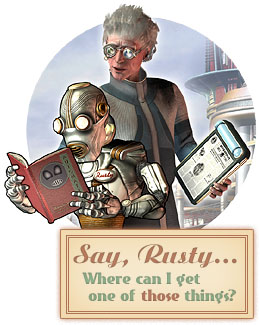 I love the idea of a reading slate, an e-reader, a tablet. I love books, after all, and no computer can match their portability or ease of use. And there’s that retro-futuristic quality about them – though honestly, even modern futurism likes the gadgets – that makes me feel right at home with an imaginary one in my hand.
I love the idea of a reading slate, an e-reader, a tablet. I love books, after all, and no computer can match their portability or ease of use. And there’s that retro-futuristic quality about them – though honestly, even modern futurism likes the gadgets – that makes me feel right at home with an imaginary one in my hand.
The problem is that we should not want the ones that are here and coming to market. They’re loaded with problems for those of us who would like to use them. Their functions and their limitations are heavily skewed toward benefits to their manufacturers’ limited and incompatible retail schemes. So much so, in fact, that as sexy as you may think that iPad demo was, or as pleased as you are to see Neil Gaiman exulting over the Kindle, these gadgets are going to lead their buyers down a dark and twisty path that leads to that place where media go to die.
A book is a simple object, which is not to say it’s a limited one. It’s portable knowledge. It – importantly – is an object that can outlive both its author and its reader. All its contents are present at once, and one can skim it or hone in on a particular page as quickly as one’s eyes and fingers can move. It can be given to a friend; it can be loaned for a short time; it can be sold or traded. It can be borrowed from a library. It can be left on a dusty shelf for a couple of decades and then picked up and read again. Someday, long after its author wrote it, it will pass into the public domain and can then be reprinted for next to nothing.
E-books, like books, are portable knowledge. But they’re very bad at everything else in that list.
You don’t buy an e-Book: through a bizarre intellectual exercise, you license it. Depending on the nature of that license your rights may only extend to a single kind of device, or even to a single instance of that device. Even when the license itself is not so limiting the reality of the hardware and software may still limit the book’s use in the same way. Because if your book’s format and its Digital Rights Management scheme are not compatible with other devices then the reality is that you’ll only be able to read the book on a particular kind of device. Ever.
If that device wears out, you may not be able to buy a new compatible device: your entire library will be gone. If marketers someday tempt you to buy a newer kind of device you may have to leave all your books behind.
Remember cassette tapes? LPs? Eight tracks? HD-DVDs? These incompatible e-Books are that same story told again.
With this addition: e-Books are recorded in several incompatible formats and are copy protected with several incompatible kinds of DRM. Even where they adopt the same basic format – like EPUB – their DRM layers can prevent documents from being readable on competing devices. Those incompatible schemes may prevent you from accessing the books you’ve paid for when you buy a new reader or when your old one breaks down… and, as I said, all your books go with it.
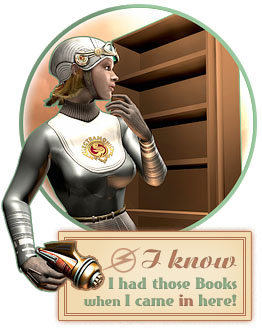 But wait! There’s more!
But wait! There’s more!
That DRM scheme may very likely be centralized at the company you purchased your book from. That company might, as Amazon has, repossess your book if they see fit.
And servers go away, too, leaving your virtual shelves empty. This has already happened to me with computer software that suddenly became useless or uninstallable even though I’d "bought" it less than a year before.
If we look back at my list of things that books do well, we find that we can resell them. As far as I can tell, you can’t resell any e-Book.
This throws a wrench in the e-Readers’ attack on the textbook market, doesn’t it?
Because the only way students have been able to reduce their expenses for textbooks has been to sell them back at the end of their class. From what we’ve seen of e-Book pricing they’ll still need to get some of that money back in a digital age. But as things stand, they can’t.
And of course reselling books affects people besides students, too. Used bookstores (and libraries) have always been my best resources for trying out unfamiliar authors. If I like ’em, I’ll buy their books new – all of them, if possible. But if I can’t try them out first I may never read them at all.
Can you lend an e-Book to a friend? No, except in a limited way with Barnes & Noble’s Nook reader. Publishers have to flag a book as lendable and the last word on that was that only about half of the books in the Nook’s bookstore could be lent. My guess would be that a very similar number of their books are in the public domain.
And how does this affect library lending? Well.
Libraries have other concerns, too. Librarians were the first to notice that unlike copyright, the DRM of digital books does not expire. (Unless the server does, of course). Even after its copyright has expired an e-Book will remain inaccessible except on a compatible device with a working license to access it.
Copyright expires. DRM is forever.
So the e-Book collector has a wide selection of ways in which all her books can disappear. The only way to bypass those is to remove the DRM from purchased e-Books… which is, of course, a violation of their license – possibly a violation of the law – and may not always be easy.
In order to protect our purchases, then, our only limited defense is to violate our licenses and, potentially, break the law. All of this in a world that’s shown us again and again that DRM almost never protects publishers.
I’m not entirely against DRM. I am in favor of copyright. I know that any barrier to pirating digital content does prevent larger numbers of people from copying it. But it doesn’t work all that well. In the case of books, it turns our collections into incompatible and temporary things that we don’t even really possess. And that just won’t work for me.
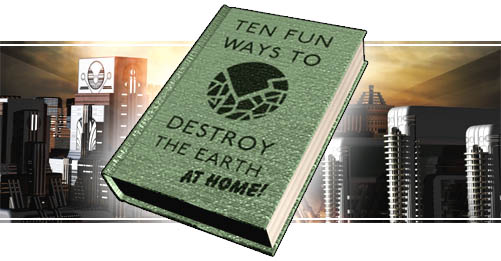
So what’s the solution? Any solution?
Here’s the way I see it. The legal protections for books, pictures, films and music are registered with national governments. The enforcement of those protections is the responsibility of those governments. In the U.S., that means that copyrights are recorded at the Library of Congress.
I think that the copyright registries should evolve into databases of copyrighted works and that those databases should be the center of a single, cross-device form of DRM. The database exists for as long as the nation exists. When a copyright expires, the work becomes freely reproducible. (And you’d better reproduce it! ‘Cause someday that database won’t be there any more. Someday electricity may not be there any more.)
If a creator does not want that protection – if he or she is publishing under a different sort of license – then the work should not be registered or, even better, registered in a different way.
That covers DRM and copyright in a solution that’s as effective (or as ineffective) as what we have now, but still allows these published works to lapse into the public domain. In that respect, it’s better: because it’ll be easy enough to see if a work’s out of copyright. Just try to copy it, and see what happens.
Since all books would share the same protection there would be fewer barriers to encoding them in the same format. If that happens, then all e-Readers will be compatible… like VCRs, DVD players, CD Players, and Blu-Ray players. What a concept – to simply pick up a book, any book – and… read it! Could we adapt to such sweeping change?
If it hasn’t yet occurred to you, publishers have no incentive to adopt this kind of plan. It’s a solution that only consumers will (or should) want badly.
What about lending and resale? These aren’t insurmountable problems either, though again publishers have no incentive to resolve the problems. They want us to buy their new books. They’re not losing sleep about anything else.
But in software development we’ve commonly seen the use of license keys, dongles, and other methods that would work as well for e-Books as they do with computer programs (which is to say, they sort of work). Publishers would be no worse off if they adopted a standard form of registration that allowed a protected e-Book to be lent or sold by transferring a software key. And if the copyright database lists it as public domain… there would be no restriction at all.
This would benefit hardware makers. If their devices could read any published e-Book then their devices would be more valuable to users. A big barrier to the acceptance of their devices would be removed. But publishers, again, have no incentive. Unless they’re forced to adopt this kind of solution they simply won’t do it.
Add to that the problem of herding a whole bunch of cats toward a unified goal and what you have, I’m afraid, is the sorry state of digital books today.
We really want them: they get our attention, all right. We love the idea of them. But what they offer at the moment is a poor alternative to a shelf full of books.
What About the iPad?
Here’s an odd thing.
I hate devices that are only good for consuming media. That goes way back to the earliest game consoles, especially since they were mainly targeted at children. I would much, much rather see a child with a computer than a console because even if its potential is never tapped, a computer can be used to make things, not simply to consume what others have already made.
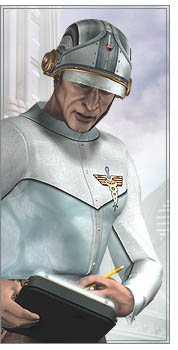 I guess the only reason I don’t hate televisions and music players is that I’ve known them all my life and I take their limits for granted.
I guess the only reason I don’t hate televisions and music players is that I’ve known them all my life and I take their limits for granted.
The odd thing is that I don’t hate e-Readers. I just can’t figure it out.
It may be that it’s because – if they didn’t have all the problems I described above – they would enable me to do something that I already do and enjoy, but in a better way.
And that would also explain why I think the iPad is a lousy device. Because it wants to do things that I already do and enjoy, but in a worse way.
For starters, the e-ink screens of the e-Readers are easier to read for long periods and in different lighting conditions. LCD screens have color – which is great! – but they’ll be a lot harder on your eyes.
And yet that’s not really the thing. The problem is that the iPad is a computer. Just not a very good one. One that will only let you run software that’s come from Apple’s company store. It’s bad enough that it uses a unique OS, which limits your choices: but the manufacturer also decides what software you’ll be able to use. Like all Apple products, you can buy it… you just can’t own it. Apple always will.
This has obviously not been a problem for the iPhone. Heck, Marge, it’s a friggin phone. But the iPad tries to be a tablet computer that can be used like a computer – and those same limitations just aren’t acceptable in a device you use to work with.
Unless, of course, a big bunch of people just think it’s so cool that they buy them up by the truckload… which is actually what I think will happen. Because the main product of Apple Computer is not computers. It’s attitude. With some nice industrial design. And folks respond to that.
Enough With Captain Negative
Since I don’t think the iPad is a good device I’ve wondered what a similar good device would be.
The idea of a tablet computer is pretty cool. The upcoming HP Slate is interesting; the Gigabyte TouchNote T1028X, with its swivelling and folding screen, is both a small laptop and a tablet-like computer; and there are some interesting hybrid netbooks with detachable tablet screens, like the affordable Always Innovating Touch Book and the less affordable Lenovo IdeaPad U1.
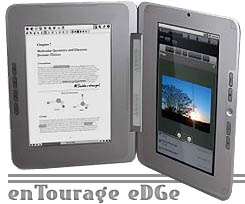 Then there’s the dual e-ink/LCD screens of the enTourage eDGe, which (in spite of its reckless use of capital letters) may offer the best of both worlds. It’s a pretty slick idea that really does resemble those ancient slates that are the ancestors of our e-Readers and netbooks.
Then there’s the dual e-ink/LCD screens of the enTourage eDGe, which (in spite of its reckless use of capital letters) may offer the best of both worlds. It’s a pretty slick idea that really does resemble those ancient slates that are the ancestors of our e-Readers and netbooks.
That’s a bit like Microsoft’s Courier project except that the eDGe uses one LCD and one e-ink screen instead of Courier’s two facing LCDs.
Some of these devices may share the problem of using an unusual OS. But they’re free of the problem of the company store.
The thing is, it’s a jungle out there. Almost any decision you make until the file format and DRM problems are resolved is going to cause you trouble down the line. Almost any book purchase you make will turn out to be a temporary license… a rental… either through intent, or simply through the passage of time.
We’re so used to format wars and incompatibilities in music and video that we may not even stop to think what an unacceptable thing it is – in any media, really, but how much more so when it comes to the book?




I’d just like to clarify a misconception that I had. My husband bought me a nook for Christmas. I had no idea what it was……I’m technologically challenged if you know what I mean. I didn’t think I’d like it. It took me a while to figure out. With it being inside the cover/case, it’s just like holding a book to read. Once you figure out how to “work” it, it’s great! I have so many, many books at home. When I go anywhere, I always take a few with me. This takes up so little space! Most people have cell phones to charge up when they go places….this needs some charging, but It’s a small cable and plugs into a pc or a regular outlet. Not a big deal at all! It takes no time to download books, either. You can get newspaper and magazine subscriptions as well. If you plan to travel, you can get the local news from wherever it is you’re going. It’s a great little gadget. I’m hooked!
I hope I made it clear that I do think this type of gadget is great – it’s just that (so far) the way the e-books themselves are encoded and saddled with DRM in different and incompatible ways make them a bad bargain in comparison to an actual physical book.
If a new technology wants to replace the book, which we’ve been changing and improving a very long time now, it had better actually be better than a book.
Just had to say, I love reading you! Your stories, your artwork, but mostly your style in general… it’s such a delight to read someone so well-spoken, who clearly chews every word thoroughly and enjoys each one. So much online content is made up of half-ideas, casual complaints with no solutions offered, or just plain whining with no more mental effort evident than a child’s tantrum requires. I find your offerings a real joy, and quite inspirational, even the ideas I disagree with! Thanks for all of it, and your wonderful attention to detail on its presentation here… I’ve never been fond of awards for their own sake, but I’ll be keeping my eye out for online groups that offer such, just to offer you a vote. Please, keep up the marvelous work!
Sincerely,
Opus
Well, thanks! You remind me that although I pretty much never agree with P. J. O’Rourke, for example, I always enjoy the way he makes me disagreeable.
Monks of Iona and the Book of Kells come to mind. You can waltz right up and start reading it or at least looking at the pictures and trying to figure it out. We haven’t left enough Rosetta stones lying around, just a scattered trail of breadcrumbs on a windy seashore heavily inhabited by hungry but illiterate seagulls. The tv show Hoarders shows filthy wretched addled folks pack ratting unsanitary rubbish. I do think one should tidy up just short of ten preserved cats per room, yet don’t we collectively need a few such deranged people to preserve our slice of life for future historians? Assuming that any one in our future is actually interested in the accoutrements of our lifespan. My generation and beyond is largely consumer oriented rather than producing or truly discovering let alone inventing anything. If the pyramids of Egypt had been buried just a few feet under sand some one might still have gone looking for them, can the same be said of our tweets, texts, and blogs? Will one good magnetic solar flare make us have to start over again?